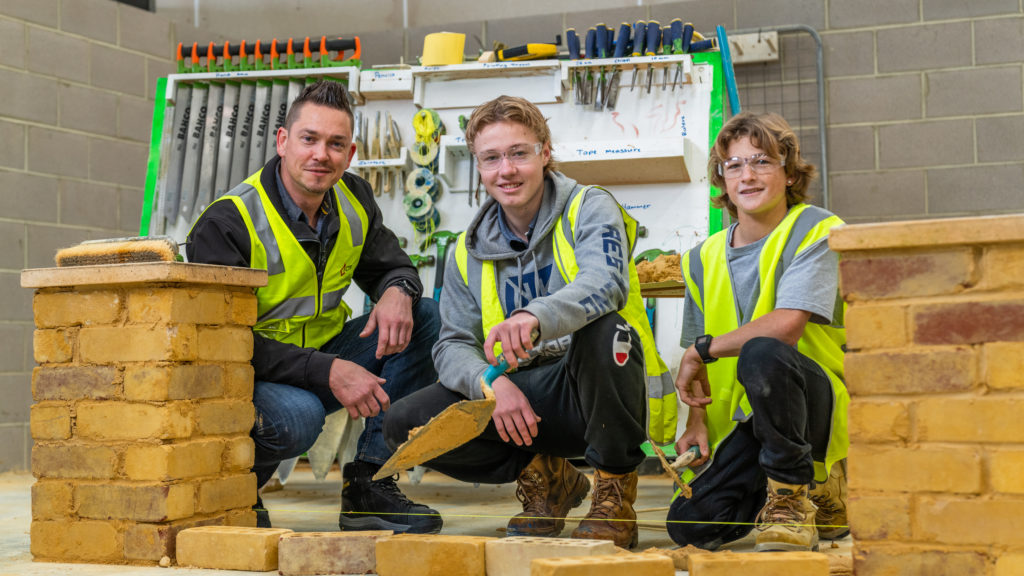Gain construction experience with CTF’s fully funded Try-A-Trade program. Participants get a taste of careers in the building industry and learn what to expect in various trades.
Our Try-A-Trade program gives students in Year 9 and above, school leavers and mature-age job seekers, a chance to try various construction trades. Selected Registered Training Organisations deliver the courses on behalf of CTF at locations throughout Western Australia.
Because CTF funds the program, there is no cost to students or schools to participate..
You can register your interest below:

Try-A-Trade Program Overview
The program allows participants to try different trades, find the right career path and learn critical skills needed for the job.
Participants gain real-world experience through practical activities led by an experienced professional. Each Try-A-Trade course runs for up to three days and focuses on two to three trades.
Once completed, participants will have gained a greater understanding of the necessary skills to start a career in construction. CTF’s Industry Training Advisors are available to help answer students’ questions and outline the next steps for education and career opportunities.
Our Try-A-Trade program aims to:
- Give participants practical and interactive construction experience through fun, hands-on activities
- Help students make educated choices about study options after school by showcasing the exciting pathways available
- Raise awareness of construction as a viable career
Try-A-Trade Program Requirements
The Try-A-Trade program is open to anyone with an interest in exploring a career in construction.
Participants are required to source and wear steel toe-capped boots and must also be able to travel to the campus where the program is offered.
School students must be in Year 9 or above and can choose to participate through school or apply as an individual if their school doesn’t participate.
Available Courses and Trades
Try-A-Trade courses are offered in a range of trade areas with a particular focus on areas where there is high demand and skills shortages.
Trades available through Try-A-Trade include:
- Bricklaying and Blocklaying
- Building Design and/or Interior Design
- Cabinet Making
- Carpentry
- Civil Construction
- Concreting
- Design
- Drafting
- Electrical
- Estimating
- Glazing
- Mechanical Fitting
- Metal Fabrication
- Painting and Decorating
- Plumbing
- Rail Infrastructure
- Scheduling
- Solid Plastering
- Stonemasonry
- Surveying
- Wall and Floor Tiling
- Wall and Ceiling Linin
Places are limited so it’s important to register your interest early to avoid missing out.
You can register your interest to be on our mailing list below:
For more information, please email ita@ctf.wa.gov.au or phone 08 9244 0100. We’re here to help.
- Hands-on learning
- The opportunity to try a trade before you commit to a long-term apprenticeship
- Learning about the variety of roles available within the construction industry and the skills required
- Meeting, talking to and learning from trade professionals, lecturers and local industry people
- No cost
- Once you express your interest to be on our mailing list, we will include you in offers for available courses. These are usually released once per semester. You only need to register once – you will remain on the mailing list until you email us to advise that you wish to be removed.
- When courses become available, priority will be given to schools and groups who have not yet had a Try-A-Trade opportunity. Applicants will be able to select from a list of courses available. Unfortunately, we cannot accommodate specific requests for providers, trades and dates.
- If there are still courses available, we continue to work through the mailing list, considering factors such as number of previous opportunities, the number of students at the school, and feedback from training providers on student conduct. We often have cancellations or places available to top up programs, so we will also continue to offer these to you.
- Courses negotiated directly with a Training Provider will not be funded by CTF. Schools may make arrangements directly with a training Provider, to secure courses that suit their preferences regarding trades and dates. However, these will be conducted at their own cost.
- Schools and groups who have already registered their interest in the last 12 months will be automatically included on the mailing list. Please let us know if you wish your email to be removed or if your contact details for your school have changed and we can update accordingly.
- Carey Training
- Cartec Training Solutions
- Central Regional TAFE
- Motivation Foundation
- MPA Skills
- North Metropolitan TAFE
- Skill Hire
- South Metropolitan TAFE
- South Regional TAFE
- Western Training
- Yalagan Registered Training
- Assist in promoting construction careers to students and parents as a possible pathway for all, particularly focusing on increased participation from females and diverse groups
- Select and refer suitable students to participate in the program
- Encourage students to attend the CTF Construction Futures Centre before applying for the program (where possible) – schools who have attended will be given preference to access places in the program
- Advise students of the program expectations, including the requirement to provide their own steel toe cap safety boots where required
- Provide us with feedback on the program, the administration processes, and the training providers, so we can continuously improve the program
- Provide a teacher to supervise students during the program if requested by the Registered Training Organisation
- To give CTF a clear picture of how much demand there is for the program
- To make it fairer for schools to apply – expressions are collected over a set period, so it is not a first-come, first-served approach
- To give students access to a broader range of opportunities to try different trades. Under the previous arrangement, some schools were often restricted to the same one or two trades.
- Schools can apply all year round.
Try-A-Trade FAQ's
Who is Try-A-Trade for?+
The program is designed for school students in Years 9 and above, as well as school leavers and mature age job seekers who have an interest in exploring construction careers. Try-A-Trade is the perfect stepping stone to starting an apprenticeship and helps you to gain insight into the construction industry.
How long does each course go for?+
Each course runs for between one and three days. Participants must be able to attend all required days.
Who funds the program?+
Try-A-Trade is fully funded by the Construction Training Fund (CTF) in Western Australia.
What are the course fees?+
There are no fees for participants or schools.
How does the program help me find a job?+
The program is designed to give participants a taste of a day in the life of different construction roles. One of the biggest benefits of our Try-A-Trade program is the advice and insights participants gain about different career options. This allows them to explore the skills required and learn about the pathways they can take to work in specific trades within the building and construction industry.
Participants find themselves in a better position to make educated decisions about their careers.
What are the benefits?+
Other benefits of our Try-A-Trade program are:
How do I apply?+
Click on the buttons above to complete an expression of interest. You can participate through your school or if you are no longer at school or want to participate outside of school, register your details so we can let you know when a public course is running.
What happens next?+
Courses are in extremely high demand, so we have revised the process for allocating courses.
How many Try-A-Trade's can I complete?+
Participants can take part in as many Try-A-Trade programs as they like, subject to availability. We encourage participants to attend as many as practical. This way, they can get a taster of multiple trades before making a career decision.
Who delivers the training?+
CTF selects and funds a range of Registered Training Organisations across Western Australia to deliver the courses.. We currently offer Try-A-Trade courses through:
Note: You must apply and be selected to participate through CTF. Do not contact training providers directly to apply. Courses negotiated directly through a training provider will not be funded by CTF.
How many places are available?+
Each course can have up to 16 participants.
The total number of courses available is currently impacted by trainer availability. As apprenticeship and pre-apprenticeship sign-ups have significantly increased in the last few years, training providers (like everyone else) are super busy! We will be working with training providers to make as many courses available as possible throughout the year, in all of the regions across WA.
Where is the program delivered? +
Try-A-Trade is delivered at an RTO’s training facility, a Trade Training Centre, or an appropriate school site. For school sites to be eligible, they need access to quality tools, equipment, and materials for the course, realistic to current construction worksite conditions.
Can we do a project at our school?+
Some training providers are able to deliver the Try-A-Trade program at school sites; however, they are not permitted to participate in ‘live works’. This is because the intent of the CTF Try-A-Trade program is to give students a chance to get hands-on experience with the typical tasks undertaken in a construction role. It is a short introductory program and has no assessment requirements, allowing students to have a go and not worry about making mistakes. As such, the quality of the work cannot be guaranteed, and any projects assembled should be disassembled and removed at the end of the course.
Live works may cause issues with insurance and meeting the relevant building standards. This is not the responsibility of CTF or the Training Provider. The funding of Try-A-Trade is not intended to supplement schools’ capital works and maintenance programs; it is a career taster experience. Even if schools are willing to fund the cost of materials, the CTF Try-A-Trade course must not be used in this way, for the range of reasons listed above.
What do schools need to do?+
We ask for schools to:
What's new in Try-A-Trade?+
Expressions of Interest are now taken through the Construction Training Fund (CTF) website.
The process has been revised for a number of reasons:
Students from Years 9 and above can participate.
The program used to only be open to Years 9 and 10, but now applications are open to Years 11, 12, and even post-school leavers – because it’s never too late to change your mind and give construction trades a go!
The range of trades available has been expanded.
Construction is a huge industry with a lot of diverse roles. We want students to be able to see roles from a range of industries including construction roles in the resources sector and more paraprofessional roles involved in design, drafting, scheduling and surveying. CTF will try to offer trades where there are skills shortages or local needs for future pipelines of work.
Last modified on:

